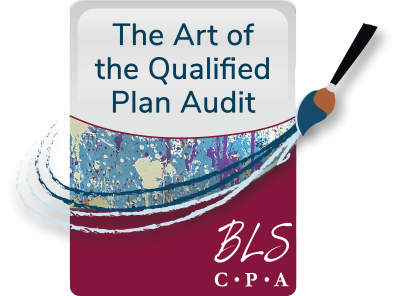Author: Maria T. Hurd, CPA
Nothing is Certain but Death, Taxes, and Retirement Plan Operational Errors
April 26, 2019
In this world, nothing can be said to be certain, except death, taxes, and retirement plan operational errors. Two decades of plan audits have shown time and time again that even the most accurate plan sponsor is not immune from making one of the common errors.
Without extra fanfare: What are the available safe harbor plan formulas?
April 24, 2019
By special request, following is a summary of the basic available safe harbor formulas, with no extra editorials. See bullet points for information about enhanced match opportunities.
Shouldn’t That Error be Considered Immaterial, even De Minimis?
June 13, 2018
When auditors identify operational errors, clients and service providers often ask whether we can ignore them since they are immaterial to the financial statements.
Improving Audit Quality Through Enhanced Financial Reporting
September 26, 2017
In response to the DOL’s findings regarding ERISA plan audit deficiency rate, the AICPA has embarked on an initiative to improve audit quality
401(k) Contribution Limits: A Walk Down Memory Lane
September 12, 2017
Internal Revenue Code Section 401(k) was added to the tax law as part of President Jimmy Carter’s Revenue Act of 1978.
Proposed Statement of Auditing Standards: Redesigning the Audit Reporting Model for ERISA Plan Financial Statements
August 28, 2017
The Auditing Standards Board created a special task force in 2015 to consider a proposal to improve the quality of employee benefit plan audits by strengthening the EBP auditors’ report.
Hardship Distributions: Source Documents vs. Documentation of Self-Certification by Participants
August 11, 2017
“The buck stops here” is a phrase that was popularized by U.S. President Harry S. Truman, who kept a sign with that phrase on his desk in the Oval Office.
The Softer Side of the IRS: Memorandum on Calculating the Maximum Participant Loan Amount
May 29, 2017
Some people believe you can never get enough of a good thing.
WEBINAR: Mastering Form 5500 Schedule: Avoiding Audit Triggers
May 16, 2017
A member of our Employee Benefit Plan Audit Team, Stacey I. Snyder, CPA, will be speaking in an upcoming Strafford live webinar, “Mastering Form 5500 Schedule: Avoiding Audit Triggers” scheduled for Thursday, May 18, 1:00pm-2:50pm EDT.
The DOL’s Assessment on the Quality of Financial Statement Audits: The Aftermath
April 20, 2017
It has been almost two years since the DOL released the results of its study of the quality of work performed by independent qualified public accountants (IQPAs).








